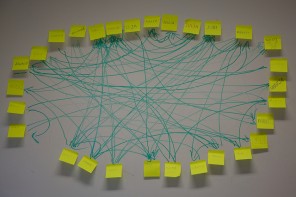When I met my future father-in-law, he looked me straight in the eye and asked, “What will you do with a PhD in English?” I will never forget my surprise—getting a PhD seemed like the next logical step after college. These days, I understand that many people ask similar questions of doctoral candidates in the humanities.
I imagine that I appear naive, and I probably am. A fellow student in my English master’s program claimed—only partly in jest—that it was more difficult to tell his parents that he wanted a PhD in English than it was to come out as gay. I think many doctoral candidates fall between these two extremes.
Nevertheless, it is not simply the skepticism of nonacademics that leaves doctoral candidates doubting their choice. Thanks to the realities of graduate studies—meager salaries, endless piles of work, vacationless vacations—many doctoral candidates wonder why they ever embarked on graduate study. Many of us find solace in our position as college instructors, as those romanticized figures inspiring intellectual curiosity in younger students. But what if you are a doctoral candidate and you’re not sure you want to teach?
Last spring, as I taught my first college-level literature class, I was struck by a fact so daunting, so debilitating, and so disturbing that I tried banishing it from my thoughts, only to feel it gnawing away at the corners of my mind throughout that spring and summer. I wasn’t enjoying teaching; I had become discouraged because I could not convince my students that there really is something to be gained by reading an eighteenth-century novel. Every minute that I taught, all I wanted was to be writing my dissertation. As I frantically reviewed the past four years of my PhD experience, I began to have serious doubts. “What am I doing here?”
I know that in today’s academic job market, confessing to a lack of passion for teaching amounts to professional suicide. Most jobs entail a heavy teaching load. But here I was—not wanting to give up the PhD but asking myself, “What am I going to do?”
When I heard about the MLA Connected Academics proseminar, my heart skipped a beat. It skipped several more when I realized that participants would have the opportunity to speak to people with PhDs in the humanities who have left academia and are eager to share their experiences.
As of now, I have attended five MLA Connected Academics seminars, and they have been wonderfully uplifting. At our first meeting, the directors of the program handed us a packet of job postings and suggested that our doctoral studies rendered us eligible for all these jobs. As I looked through the positions, I was struck by how varied and interesting they were. One job advertised a position with the New Jersey Council for the Humanities, another a writing position in a pharmaceutical company, and yet another the opportunity to be a culture critic for a Web publication. After we read through the packet, the directors taught us how to read nonacademic job advertisements so that we could identify and list the types of skills each position required. Then, we asked ourselves whether we had those skills and, if not, what we could do to gain them.
I vividly recall my excitement at the thought of being a culture critic and my disappointment when I realized that I did not have the required five years of experience. That is, until a fellow seminar participant floored me by asking, “Isn’t your dissertation a type of cultural critique?” Well, of course it is! Maybe I’m critiquing the society and culture of the eighteenth-century transatlantic world, but I am using primary documents and theory to write about the era’s cultural production, and I am making connections between then and now.
It was liberating to realize that through our doctoral studies we are gaining experience and skills that will help us pursue exciting careers in the nonacademic world. It felt even better to learn how to translate our experiences into terms that will make us competitive job applicants. When I left the first Connected Academics meeting, I felt empowered. Doctoral candidates are highly qualified to embark on a multitude of professions; all we lack is knowing how to explain why our degree is useful in a nonacademic setting. Nevertheless, we can learn—we are students, after all. After one Connected Academics meeting, I already felt more comfortable with my professional doubts. It was a relief to sit in a room with other doctoral candidates, recognize that we might not want to pursue a job in the academy, and then help one another realize the full extent of our abilities.
 Malkah Bressler is a doctoral candidate in English literature at Fordham University specializing in eighteenth-century British and transatlantic literature. Her dissertation, tentatively titled “Ecologies of the Novel: The British Novel in Caribbean Narratives,” explores how conventions of the novel—the picaresque, the sentimental, and the gothic—influence mid- and late-eighteenth-century travel narratives and journals about the Caribbean and, in particular, the representation of plantation society and the natural world of the Caribbean islands. Malkah has a long-standing interest in nonacademic careers for academics. As the vice president of Fordham University’s Graduate Student Association, she is excited to be able to relate her experiences with the proseminar to Fordham’s graduate students as well as to the administration at Fordham’s Graduate School of Arts and Sciences.
Malkah Bressler is a doctoral candidate in English literature at Fordham University specializing in eighteenth-century British and transatlantic literature. Her dissertation, tentatively titled “Ecologies of the Novel: The British Novel in Caribbean Narratives,” explores how conventions of the novel—the picaresque, the sentimental, and the gothic—influence mid- and late-eighteenth-century travel narratives and journals about the Caribbean and, in particular, the representation of plantation society and the natural world of the Caribbean islands. Malkah has a long-standing interest in nonacademic careers for academics. As the vice president of Fordham University’s Graduate Student Association, she is excited to be able to relate her experiences with the proseminar to Fordham’s graduate students as well as to the administration at Fordham’s Graduate School of Arts and Sciences.








Very encouraging – excited to find out where you go next.